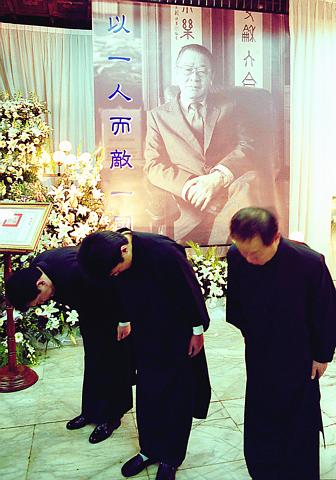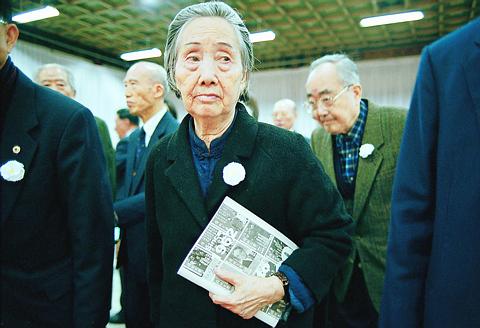Liu Shao-tang (劉紹唐), founder and publisher of the monthly magazine Biographical Literature (傳記文學), was eulogized yesterday during a funeral service in Taipei. Liu died on Feb. 10 of lung cancer, aged 80.
Historians that came to the service said Liu's efforts in collecting first-hand historical records on Chinese history from 1911 to the present day helped fill the gaps in official accounts of the same period.
"Liu has been dubbed as the head of the `unofficial Academia Historica,' and his contribution to the study of modern Chinese history is of paramount importance," said Chang Yu-fa (張玉法), a research fellow at the Institute of Modern History at Academic Sinica.

PHOTO: CHEN CHENG-CHANG, TAIPEI TIMES
Pouring rains and Chinese classical music greeted long lines of mourners who attended the service, held in the Chinghsing Hall at Taipei's First Funeral Parlor yesterday morning. Among those attending were officials, retired officials, scholars, and Huang's relatives and friends.
Two of Liu's old friends -- Liang Su-jung (梁肅戎), former Legislative Yuan speaker, and Pok Shau-fu (卜少夫), a veteran newsman -- gave their eulogies. Also invited to express his thoughts on Liu was Taipei Mayor Ma Ying-jeou (馬英九).
"I didn't see this occasion merely as an official engagement in which I as the Mayor of Taipei came to pay tribute to the founder of a monthly magazine published in Taipei. I am here to pay my respects to someone who has devoted his life to the development of culture," said Ma.

PHOTO: CHEN CHENG-CHANG, TAIPEI TIMES
In addition to praising Liu's devotion to the monthly magazine for the past 38 years, Ma expressed his own personal fondness of the publication.
"During a time when extracurricular reading materials were relatively scarce here in Taiwan, the magazine gave me an opportunity to probe the life histories of important figures in modern Chinese history. It served as the best of learning materials for me," he added.
Liu gained fame long before founding the magazine in 1962. In 1951, he published a book titled Out of Red China (紅色中國的叛徒) in which he recounted his experiences as a reporter at the Chinese Communist Party's (CCP) Xinhua News Agency, and his days in the CCP's People's Liberation Army (PLA).
Liu also described why it was he decided to leave the Communist Party after one year within the organization.
Since publication of the book, Liu was seen as a well-known anti-communist writer.
The US Information Service (USIS) later translated the book into more than ten languages as anti-communist propaganda, during a time when containment of communism was a mainstream doctrine in the West.
For historians, however, it is Liu's endeavor to found the magazine, focusing on biographic writing, that made him a key figure in preserving a record of modern Chinese history.
For this, Liu won a 1996 National Literary Award (國家文藝獎), conferred by the Council for Cultural Affairs.
Liu founded the magazine in Taiwan in June 1962, at the age of 40. It coincided with an era when publishing contemporary history could land an author in jail.
Until this year, the magazine has been published uninterruptedly for a total of 452 issues, relying on a single editor, no advertising revenue, and no subsidies. Cultural critics often described the magazine's longevity as "a miracle" in Taiwan's publishing industry.
Chang said Liu's decision to launch the magazine was influenced by Hu Shih (胡適), the great thinker. "Hu was an advocate of biographic writing. He believed that everybody should write their own stories to serve as eyewitnesses to their times. And Liu carried out Hu's dream," Chang said.
The majority of the articles released in the magazine were first-hand materials because many were accounts of personal experiences, chang said.
"These publications are very helpful to historians focusing on modern Chinese history," he said. "But for the existence of this magazine, I believe many of the precious historical accounts would have disappeared for good."
But historians also admit that the publication had its dark days -- Liu started the journal recording events and dissecting the actions of important figures, back during the time when Taiwan was still under martial law.
Chen San-ching (陳三井), a research fellow at the Institute of Modern History at Academic Sinica, gave a vivid example.
"When the magazine touched upon sensitive political issues, such as how many women Sun Yat-sen (孫中山), founder of the Republic of China, had in his life, the authorities were concerned, fingering Liu as a tool of the communists," Chen said.
But the magazine stands out as a pinnacle of achievement among those of its kind in Taiwan and China, Chen said. "In terms of content, quality and accuracy, the magazine is an unprecedented accomplishment."
On March 30, a panel discussion on the contribution of the magazine to the study of modern Chinese history will be held at the mayor's former residence, now a venue for cultural events.
According to the organizers of the event, a one-month exhibition on Liu's life will be held concurrently at the same venue.

CHIP WAR: The new restrictions are expected to cut off China’s access to Taiwan’s technologies, materials and equipment essential to building AI semiconductors Taiwan has blacklisted Huawei Technologies Co (華為) and Semiconductor Manufacturing International Corp (SMIC, 中芯), dealing another major blow to the two companies spearheading China’s efforts to develop cutting-edge artificial intelligence (AI) chip technologies. The Ministry of Economic Affairs’ International Trade Administration has included Huawei, SMIC and several of their subsidiaries in an update of its so-called strategic high-tech commodities entity list, the latest version on its Web site showed on Saturday. It did not publicly announce the change. Other entities on the list include organizations such as the Taliban and al-Qaeda, as well as companies in China, Iran and elsewhere. Local companies need

CRITICISM: It is generally accepted that the Straits Forum is a CCP ‘united front’ platform, and anyone attending should maintain Taiwan’s dignity, the council said The Mainland Affairs Council (MAC) yesterday said it deeply regrets that former president Ma Ying-jeou (馬英九) echoed the Chinese Communist Party’s (CCP) “one China” principle and “united front” tactics by telling the Straits Forum that Taiwanese yearn for both sides of the Taiwan Strait to move toward “peace” and “integration.” The 17th annual Straits Forum yesterday opened in Xiamen, China, and while the Chinese Nationalist Party’s (KMT) local government heads were absent for the first time in 17 years, Ma attended the forum as “former KMT chairperson” and met with Chinese People’s Political Consultative Conference Chairman Wang Huning (王滬寧). Wang

CROSS-STRAIT: The MAC said it barred the Chinese officials from attending an event, because they failed to provide guarantees that Taiwan would be treated with respect The Mainland Affairs Council (MAC) on Friday night defended its decision to bar Chinese officials and tourism representatives from attending a tourism event in Taipei next month, citing the unsafe conditions for Taiwanese in China. The Taipei International Summer Travel Expo, organized by the Taiwan Tourism Exchange Association, is to run from July 18 to 21. China’s Taiwan Affairs Office spokeswoman Zhu Fenglian (朱鳳蓮) on Friday said that representatives from China’s travel industry were excluded from the expo. The Democratic Progressive Party government is obstructing cross-strait tourism exchange in a vain attempt to ignore the mainstream support for peaceful development

ELITE UNIT: President William Lai yesterday praised the National Police Agency’s Special Operations Group after watching it go through assault training and hostage rescue drills The US Navy regularly conducts global war games to develop deterrence strategies against a potential Chinese invasion of Taiwan, aimed at making the nation “a very difficult target to take,” US Acting Chief of Naval Operations James Kilby said on Wednesday. Testifying before the US House of Representatives Armed Services Committee, Kilby said the navy has studied the issue extensively, including routine simulations at the Naval War College. The navy is focused on five key areas: long-range strike capabilities; countering China’s command, control, communications, computers, cyber, intelligence, surveillance, reconnaissance and targeting; terminal ship defense; contested logistics; and nontraditional maritime denial tactics, Kilby